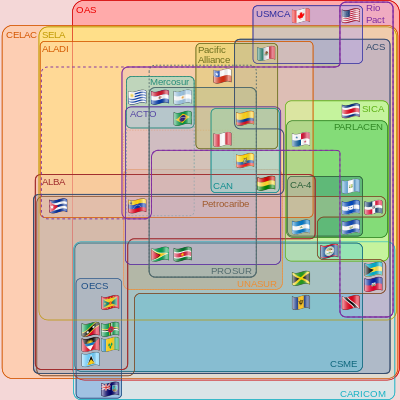Central American Parliament
The PARLACEN origins date back to the Contadora Group, a project of the 1980s that sought to help resolve the civil wars in El Salvador, Guatemala, and Nicaragua.
The Treaty establishing the Central American Parliament and other political bodies was signed in 1987; its first formal session was carried out on 28 October 1991 in Guatemala City.
They shall make possible to strengthen the dialogue, the common development, democracy and pluralism as fundamental elements for peace in the region and the integration of Central America.
The agreement of PARLACEN and other political authorities was signed in October 1987 by Guatemala, El Salvador, Costa Rica, Nicaragua, and Honduras.
[2] However PARLACEN signaled a shift in approach when on 28 April 2022 it made a statement to support a One China policy.
The vote was made at the request of the Nicaraguan delegation which argued that "Taiwan lacks recognition as a sovereign state at the United Nations” and that the "observer status that Taiwan holds at PARLACEN is illegitimate due to lack of legal status”, also noting a UN resolution concerning Chinese representation at the UN.
[6] PARLACEN is the regional assembly of SICA and acts as a permanent political organ to represent opinions and to carry out analyses and discussions about political, economic and cultural affairs of common interest, of basic conditions for democracy, peace, and the integration of Central America, as well to work out initiatives for its realization.
Since 2010, it has been a full member of the Central American Parliament with delegates elected directly by universal suffrage.
Panama also showed more interest in membership after SICA signed a free trade agreement with the European Union.
Extraordinary commissions are established by the Plenum for affairs that are of special importance and institutional significance for PARLACEN as well as for the process of integration.
It coordinates and manages the advice of the commissions and has to assist the extended board with developing the agenda for Plenum meetings when necessary.
[17] Costa Rica, one of the wealthier countries in the region and an otherwise-active participant in the SICA, has not ratified the Esquipulas II agreement, and is not represented in the Parlacen.
The killings raised questions regarding corruption and drug trafficking in Central America as well as the high level of infiltration of the Guatemalan national police force by organized crime.

